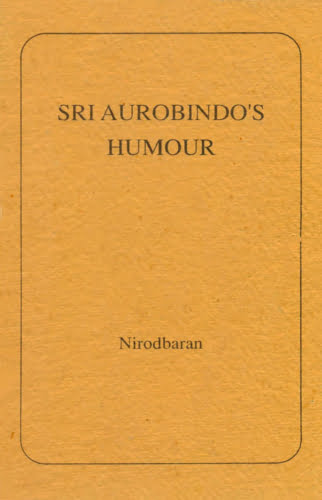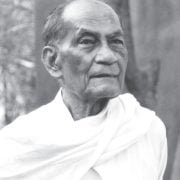Sri Aurobindo’s Humour by Nirodbaran

Sri Aurobindo’s Humour
This book represents a new and, to the general public, quite an unfamiliar aspect of Sri Aurobindo — his humour. There is a common belief that yogis and saints are grave and reserved by nature. They have no sense of humour. Sri Ramakrishna was probably the first among them who is known to have shattered this false notion. Sri Aurobindo was revered and accepted as a great yogi, philosopher and poet, but was considered to be dry and dreary. His sublime philosophical writings dating from the Arya-period were perhaps responsible for this popular misconception. During his political life too he was branded as ’the man who never smiles’. Even to his disciples who saw him only four times a year, he appeared grave and austere, yet with a quiet compassion which made him so lovable as a Guru.
When I wrote to him complaining that his ”Himalayan austerity and grandeur take my breath away, making my heart palpitate!” he replied: ”O rubbish! I am austere and grand, grim and stern! every blasted thing I never was! I groan in an un-Aurobindian despair when I hear such things. What has happened to the common sense of all of you people ? In order to reach the Overmind it is not at all necessary to take leave of this simple but useful quality. Common sense by the way is not logic (which is the least common sense-like thing in the world), it is simply looking at things as they are without inflation or deflation-—not imagining wild imaginations—or for that matter, despairing ’I know not why’ despairs.”
Book Details
Author: Nirodbaran
Print Length: 105p.
Publisher: Sri Aurobindo Ashram
Submitted by: Avinash Tiwari
Book format: Pdf, ePub, Kindle
Language: English
Book Download
Contents
GENERAL HUMOUR
- 1933
- 1934
- 1935
- 1936
- 1937
- 1938
CORRESPONDENCE HUMOUR
- 1935
- 1936
- 1937
POETIC HUMOUR
- 1934
- 1935
- 1936
- 1937
- 1938
MEDICAL HUMOUR
Medical Humour: Boil
- 1935
- 1936
- 1937
Medical Humour: General
- 1935
- 1936
- 1937
- 1938
Sample
Sri Aurobindo’s Humour
(1)
MYSELF: You refuse to be a Guru and decline to be a Father, though ladies specially think of you and call you by the latter. If they know this, I think I shall have to run from one lady to another with smelling salt!
SRI AUROBINDO: Father is too domestic and semitic—Abba Father! I feel as if I had suddenly become a twin brother of the Lord Jehovah. Besides there are suggestions of a paternal smile and a and uplifted to smite which do not suit me. Let the ladies ”father” me if smelling salts are the only alternative, but let it not be generalised.
(2)
MYSELF: My big photo requires Sanjiban’s treatment. Granted permission?
SRI AUROBINDO: What? which? where? how? what disease? What medicine wanted?
MYSELF: I send you your big photo, it is your photo that would be drawn by Sanjiban.
SRI AUROBINDO: You are always plunging me into new mysteries. If it is a photo, how can it be drawn by anybody? And what is the tense, connotation
About Author: Nirodbaran
 Nirodbaran was born on November 17, 1903 in Chittagong (now Bangladesh). He lost his father when he was five years old. After passing Matriculation Examination, he participated in the famous Non-Cooperation Movement and was punished with two months’ imprisonment. After passing Intermediate Examination in the first division, he decided to go to England to qualify for the Bar. In 1924, he went abroad, but finally went in for Medical Studies at Edinburgh. After a long six-year course, he took the M.B.C.H.B. Degree and then went on a tour of Europe with his niece. His meeting with Dilip Kumar Roy, the famous musician in Paris, sealed his fate. His niece, having heard about Sri Aurobindo from Dilip Kumar Roy, met the Mother and was highly impressed. On her repeated requests, Nirodbaran, after coming to India in 1930, met the Mother and was overwhelmed and had a spiritual experience. After some vacillation he finally felt the call and joined Sri Aurobindo Ashram in 1933, leaving behind the prospect of a highly lucrative career. In the Ashram he entered upon a new life and had many experiences and realizations. With Sri Aurobindo’s help and inspiration he flowered into a wonderful poet. His correspondence with Sri Aurobindo is an invaluable treasure. In 1938 when Sri Aurobindo broke his leg, he was drawn into the inner circle of Sri Aurobindo’s personal attendants. He served Sri Aurobindo till his passing away in 1950. He had the extraordinary good fortune of being Sri Aurobindo’s scribe when the latter dictated “Savitri” to him. He had been engaged with Sri Aurobindo International Centre of Education as a teacher of English, French and Bengali. He has been a prolific writer, in English and Bengali, having to his credit quite a few beautiful books (“Twelve years with Sri Aurobindo” and “Memorable Contacts with The Mother” deserve special mention) and numerous articles which will not only rank as fine literature, but also serve as an invaluable guide for knowing Sri Aurobindo and the Mother, their teachings, their many-splendoured personality and also about the Ashram and the disciples.
Nirodbaran was born on November 17, 1903 in Chittagong (now Bangladesh). He lost his father when he was five years old. After passing Matriculation Examination, he participated in the famous Non-Cooperation Movement and was punished with two months’ imprisonment. After passing Intermediate Examination in the first division, he decided to go to England to qualify for the Bar. In 1924, he went abroad, but finally went in for Medical Studies at Edinburgh. After a long six-year course, he took the M.B.C.H.B. Degree and then went on a tour of Europe with his niece. His meeting with Dilip Kumar Roy, the famous musician in Paris, sealed his fate. His niece, having heard about Sri Aurobindo from Dilip Kumar Roy, met the Mother and was highly impressed. On her repeated requests, Nirodbaran, after coming to India in 1930, met the Mother and was overwhelmed and had a spiritual experience. After some vacillation he finally felt the call and joined Sri Aurobindo Ashram in 1933, leaving behind the prospect of a highly lucrative career. In the Ashram he entered upon a new life and had many experiences and realizations. With Sri Aurobindo’s help and inspiration he flowered into a wonderful poet. His correspondence with Sri Aurobindo is an invaluable treasure. In 1938 when Sri Aurobindo broke his leg, he was drawn into the inner circle of Sri Aurobindo’s personal attendants. He served Sri Aurobindo till his passing away in 1950. He had the extraordinary good fortune of being Sri Aurobindo’s scribe when the latter dictated “Savitri” to him. He had been engaged with Sri Aurobindo International Centre of Education as a teacher of English, French and Bengali. He has been a prolific writer, in English and Bengali, having to his credit quite a few beautiful books (“Twelve years with Sri Aurobindo” and “Memorable Contacts with The Mother” deserve special mention) and numerous articles which will not only rank as fine literature, but also serve as an invaluable guide for knowing Sri Aurobindo and the Mother, their teachings, their many-splendoured personality and also about the Ashram and the disciples.

Leave a Reply
Want to join the discussion?Feel free to contribute!